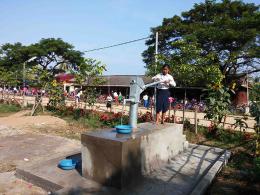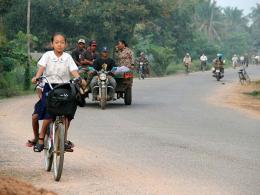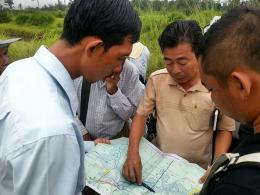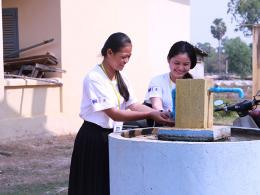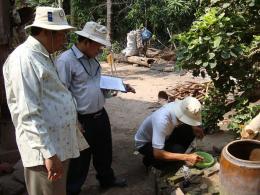Upgrading the Climate Investment Information Database of Sub-National Government of Cambodia
Background
The Royal Government of Cambodia has approved the National Program on Sub-national Democratic Development Phase 2 (NP2) to deliver the efficiency and accountability of the public services to citizens and local economic development, including the Climate Change Vulnerability, Disaster Risk Reduction, Gender and Social Equity and Inclusiveness Mainstreaming. Climate change has been categorized as a cross-cutting component to support the achievement of the NP2 and will be tracked and monitored carefully. In the updated NDC submitted in December 2020, the number of actions was raised to support the upgrade of public service delivery to respond to climate change challenges.
To ensure the effectiveness of the strategy achievement, the actions need to be fully operated and implemented more transparently and efficiently in the phase of the digital economy. The diagram below briefly indicates how climate change is integrated into the NP2.
Overall Objective
To strengthen the government ICT system's capacity and open a gateway of climate data transferred the national systems of MoP, MoI, and MoE under the coordination of NCDDS
Specific Objectives
By the end of the project, it is expected that there will be a public climate investment data platform available for different groups of users that are administered by the government institution, and the data collection mechanism through the local government is strengthened.
Approach
NCDDS is a coordination agency among National Agencies, Sub-national Governments, Civil Societies, and Academia to implement decentralization policy reform, Enhancing Accountability, Inclusive, Disaster Risk Reduction, and Climate Change Adaptation sub-national government in Cambodia. The project will achieve the results through the engagement of project counterparts as below:
- National government counterparts: MoP (sustainability of climate data transfer, enhancement of climate data collection and data entry, review of investment system); MoE (capacity building agency); DCC (interlinkage of climate data and technical experts); and MoI (Technical Support to SNAs)
- SNAs: coordinating to pilot the system and collecting climate information.
- NGOs, Academia, Development Partners: participation in the training and workshop and provision of input for system development and improvement
- Public audience: users of information.
Since it is the new initiative for a climate investment information system, it is expected that the engagement from the above stakeholders is considered sufficient to ensure project's sustainability.
For the sustainability of the production of climate change vulnerability index in the NCSD’s data portal, the new approach was proposed to replace the existing practice that NCDD is directly providing the raw Commune Database to NCSD.
Outputs and Key Activities
| Result | Key Activities |
|---|---|
|
|
|
|
|
|
Knowledge Products
• The Project Implementation Database (pID) records projects and contracts implemented by Commune / Sangkat by using their budget resources. The pID contains project outputs, costs, procurement and contract administration details, and the process, including compliance with land acquisition and environmental safeguards procedures. The PID is used to generate Statements of Expenditure which are the basis of reimbursement for eligible expenditures. PID is principally a database of investments in local infrastructure, although some non-infrastructure investments are also recorded. The pID is a tool for tracking the project implementation at the SNA. Most source of fund are from national level like a commune and Sangkat fund and other funding sources that are already out of date.
• The Sub-National Project Database (sPD) records all the proposed projects requested from the sub-national, including Capital/Province District / Municipality /Khan and Commune/Sangkat. This current system could record only all the planning and implementation projects in the SNAs with the planning budget and actual expenditure. The sPD record all investment projects at SNAs classified by funding sources such as: provincial departments, NGOs, private sectors, and others. The system can also track the project purposes through the guidance of Sub-national Planning Guidelines.
• However, pID and sPD cannot produce climate investment data records at SNAs. The project will harmonize those systems produce climate investment at SNAs for public users and SNAs for public users.
| Timeframe | Total Budget | Partners | Location |
|---|---|---|---|
|
18 months |
USD 94,967 (Total) CCCA USD 94,967 |
MOP, MOE, MOI, SNAs |
Phnom Penh |


